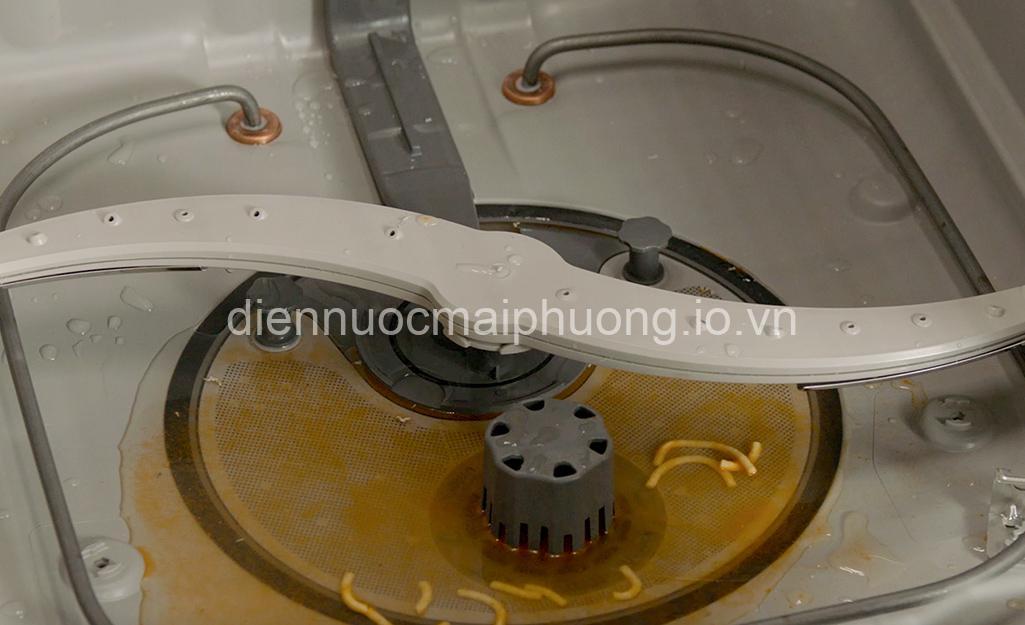Water knowledge
Clogged Dishwasher Drain? Find the Cause & Fix It!
Clogged Dishwasher Drain? Find the Cause & Fix It!. In today’s article, diennuocmaiphuong.io.vn will explore with you in the most detailed and complete way. See now!
Common Causes of a Clogged Dishwasher Drain
A clogged dishwasher drain can be a real headache, but it’s often a problem that can be solved with a little know-how. Let’s take a look at some of the most common culprits:
Food particles and debris are the number one cause of dishwasher drain clogs. Even the smallest bits of food can build up over time and create a blockage.
Grease and oil from cooking can solidify in the drain hose and create a sticky mess that traps other debris.
Soap scum and mineral buildup can form over time, especially if you use hard water. This buildup can constrict the drain hose and hinder water flow.
Hair and other small objects can find their way into the drain hose, often through the air gap. These can create a partial or complete blockage.
Blockages in the drain hose are common, especially if the hose is old or has been kinked.
Blockages in the air gap can occur if food particles or other debris accumulate in the air gap vent. This can prevent proper drainage and cause water to back up into the dishwasher.
Issues with the drain pump can occur if the pump is worn out or damaged. A faulty pump can fail to remove water from the dishwasher, leading to a clog.

Identifying the Signs of a Clogged Dishwasher Drain
Before you start troubleshooting, it’s essential to recognize the signs of a clogged dishwasher drain. Here are some key indicators:
- Water pooling on the floor near the dishwasher: This is a clear sign that water is not draining properly.
- Dishes not getting fully clean: A clogged drain can prevent the dishwasher from effectively rinsing and cleaning dishes.
- Dishwasher making unusual noises (gurgling, rattling): A clogged drain can create unusual sounds as water struggles to flow through the drain system.
- Dishwasher not draining properly: Water may remain in the bottom of the dishwasher after a cycle, or it may take a long time to drain.
- Overflowing dishwasher: A severe blockage can cause the dishwasher to overflow, leading to a messy cleanup.
- Slow draining speed: If the dishwasher is taking longer to drain than usual, it may be a sign of a partial blockage.
- Water remaining in the bottom of the dishwasher after a cycle: This indicates that the drain is not working properly.
Troubleshooting Steps for a Clogged Dishwasher Drain
Now that you know the signs and causes of a clogged dishwasher drain, let’s get into the troubleshooting process:
Step 1: Check the Drain Hose and Air Gap:
- First, inspect the drain hose for any kinks, bends, or obstructions.
- Check the air gap for clogs and ensure it’s properly connected.
- Clean the air gap and drain hose as needed.
Step 2: Clean the Dishwasher Filter:
- Locate the dishwasher filter and remove it.
- Clean the filter thoroughly using a brush or toothbrush.
- Reinstall the filter securely.
Step 3: Check the Drain Pump:
- Inspect the drain pump for any signs of damage or wear.
- Test the pump’s functionality by running a drain cycle.
- If the pump is faulty, it may need to be replaced.
Step 4: Check for Blockages in the Drain Line:
- Locate the dishwasher drain line connection point.
- Use a drain snake or plumber’s snake to clear any obstructions in the line.
- Flush the line with water to ensure it’s completely clear.
Step 5: Remove Food Debris from the Dishwasher:
- Use a flashlight to inspect the dishwasher interior for food debris.
- Remove any visible food particles using tongs or a vacuum cleaner.
- Run a rinse cycle to flush out any remaining debris.
Step 6: Use a Commercial Dishwasher Drain Cleaner:
- Use a commercial drain cleaner specifically designed for dishwashers.
- Follow the manufacturer’s instructions carefully.
- Note: This should be a last resort, as harsh chemicals can damage the dishwasher.
When to Call a Professional
While you can often resolve a clogged dishwasher drain yourself, there are times when it’s best to call a professional plumber. Here are some situations where professional help is recommended:
- If you’re unable to resolve the issue after trying the above steps.
- If you suspect a major problem with the dishwasher, such as a faulty pump or drain hose.
- If the drain line is clogged beyond the reach of a drain snake.
Prevention Tips for Clogged Dishwasher Drains
The best way to avoid a clogged dishwasher drain is to practice good prevention habits:
- Scrape food scraps off dishes before loading them in the dishwasher: This simple step can make a big difference in reducing food debris entering the drain.
- Use a food disposal unit to grind up food waste before it enters the drain line: A garbage disposal can significantly reduce the amount of food waste that makes its way to your dishwasher drain.
- Run a rinse cycle after every use to prevent food debris from accumulating: A quick rinse helps to prevent food from drying and sticking to the drain hose.
- Clean the dishwasher filter regularly: A clean filter prevents food debris from clogging the drain.
- Avoid overloading the dishwasher: Overloading can prevent proper water circulation, leading to food particles settling in the drain hose.
- Use dishwasher detergent specifically designed for your appliance: The right detergent helps to prevent soap scum buildup that can lead to clogs.
Understanding the Dishwasher Drain System
To better understand how to troubleshoot a clogged dishwasher drain, it’s helpful to know how the drain system works:
- How does the dishwasher drain work?
- The role of the drain hose: The drain hose connects the dishwasher to the drain line and carries wastewater away.
- The function of the air gap: The air gap is a small vent that prevents wastewater from backing up into the dishwasher.
- The purpose of the drain pump: The drain pump removes water from the dishwasher and pushes it through the drain hose.
- How the drain system connects to the plumbing: The dishwasher drain hose connects to the drain line, which typically runs into the main drain line in your home.
Maintaining Your Dishwasher Drain
Following these simple tips can help you maintain your dishwasher drain and prevent clogs from forming:
- Regular cleaning and maintenance: Clean the dishwasher filter and check the air gap regularly.
- Preventing clogs from forming: Practice the prevention tips mentioned earlier, such as scraping food scraps off dishes and using a food disposal unit.
- Recognizing early signs of a potential issue: Pay attention to any signs of a clogged drain, such as slow drainage or unusual noises. Address any issues promptly to prevent them from worsening.
- Common dishwasher drain problems and solutions: Familiarize yourself with common drain problems, such as kinks in the hose, clogged air gaps, and faulty pumps.
FAQs About Troubleshooting a Clogged Dishwasher Drain
What are some common causes of a clogged dishwasher drain?
Food debris, grease and oil, soap scum, hair, and blockages in the drain hose and air gap are common causes.
Why is my dishwasher not draining properly?
This can be caused by a clog in the drain hose, air gap, or drain pump.
How do I clean a clogged dishwasher drain?
You can try cleaning the drain hose, air gap, and filter. You may need to use a drain snake or a commercial dishwasher drain cleaner.
How often should I clean the dishwasher filter?
It’s recommended to clean the filter at least once a month.
What should I do if I can’t fix the dishwasher drain myself?
Contact a professional plumber if you can’t resolve the issue or suspect a major problem with the dishwasher.
Conclusion
A clogged dishwasher drain can be a frustrating problem, but it’s often a simple fix. By understanding the common causes, recognizing the signs, and following the troubleshooting steps outlined above, you can often resolve the issue yourself. Remember to practice good prevention habits to keep your dishwasher drain flowing smoothly and your dishes sparkling clean. For more expert advice and a wide range of high-quality electrical and water products, visit diennuocmaiphuong.io.vn.
Please share your experiences with clogged dishwasher drains and any troubleshooting tips you’ve found helpful in the comments section below!
[LINK: diennuocmaiphuong.io.vn] [Author: Jessica David Rodriguez]